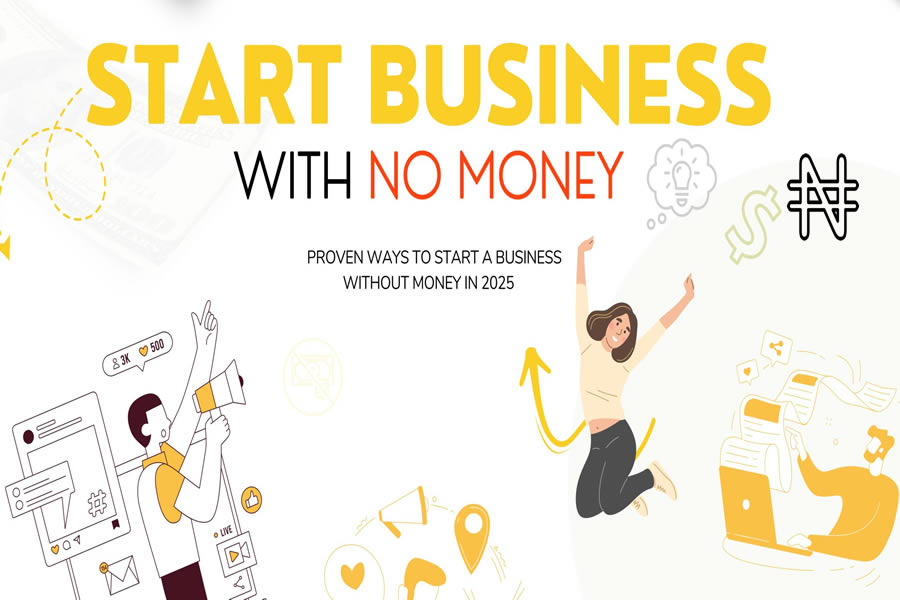Starting a Business Without Capital—What’s Real and What’s Rubbish
In Nigeria today, “start a business with zero capital” is one of the most overused phrases on social media. You’ve probably seen ads claiming you can become a millionaire overnight without spending a kobo. Sounds great, right? The reality is more complicated. While it is possible to start small with little or no money, there are also a lot of myths and half-truths out there.
Let’s separate the real opportunities from the rubbish advice.
✅ What’s Real: Businesses You Can Actually Start With Little or No Capital
- Service-Based Skills
If you have a skill, you don’t always need heavy startup funds. Examples:- Freelance writing, design, or video editing (only need a phone/laptop and internet)
- Tutoring or coaching (online or physical)
- Cleaning, laundry, or home services (low-cost to start, pay-as-you-grow)
- Dropshipping and Reselling
With dropshipping, you don’t need to buy stock upfront. You partner with suppliers, take customer orders, and only buy after payment. The same goes for “pre-order” models where customers pay first before you purchase. This works well for clothes, gadgets, and cosmetics—if you build trust.
- Content Creation and Social Media Marketing
If you have a phone and internet, you can create a page around a niche (food, fashion, motivation, comedy, etc.). With consistency, you can monetize through ads, affiliate links, or brand partnerships. While it takes time to grow, it doesn’t require huge capital upfront.
- Agribusiness Micro-Models
You don’t need to own farmland to enter agriculture. With produce aggregation, you can buy small quantities from farmers and resell to urban buyers. Some youths even start poultry or fish farming with backyard setups using recycled materials.
- Affiliate Marketing
Many Nigerian companies and global platforms now offer affiliate programs. You simply market products online, and every sale through your referral link earns you a commission. The cost? Mostly just data and effort.
❌ What’s Rubbish: Myths and Misleading Claims
- “You Can Start Any Business With Zero Capital”
False. Some businesses—like restaurants, transport, or manufacturing—require real money to begin. Passion alone won’t buy equipment, rent, or staff.
- “Grants and Loans Are Free Money Waiting for You”
While opportunities exist, they are competitive. You need a solid plan, documentation, and sometimes connections. Don’t bank on grants as your primary way of starting.
- “Social Media Riches Overnight”
Some “mentors” promise that posting twice a day on Instagram will make you rich fast. Reality check: content creation takes consistency, creativity, and often months (or years) before big paydays arrive.
- “Just Copy Someone Else’s Idea and Cash Out”
Copy-paste businesses usually fail because you don’t understand the market dynamics or customer base. What works for one person may not work in your environment.
- “Capital Isn’t Important—Only Hard Work”
Motivation is good, but money matters. Even service businesses need data, transport, or tools. Be realistic: starting without capital means starting lean, not literally with zero expenses.
Smart Approach: If You’re Starting With Little to No Capital
- Leverage what you already have – skills, a phone, your network.
- Start with services, not products – less upfront cost, faster cash flow.
- Use free tools – Canva, WhatsApp, Instagram, Google Docs.
- Reinvest quickly – put every kobo earned back into growing the business.
- Be transparent – if you’re using pre-orders or dropshipping, build trust.
In Conclution
Starting a business without capital isn’t a myth, but it’s not magic either. What’s real is starting small, using your skills, creativity, and existing resources. What’s rubbish is believing you can build a thriving business without effort, strategy, or at least some minimal investment.
In Nigeria’s tough economy, the smartest entrepreneurs are those who start lean, grow gradually, and turn little beginnings into big ventures.

